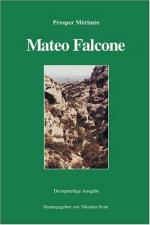|
This section contains 2,139 words (approx. 6 pages at 400 words per page) |

|
Bertonneau is a Temporary Assistant Professor of English and the humanities at Central Michigan University, and Senior Policy Analyst at the Mackinac Center for Public Policy. In the following essay, he examines the roles of treachery and vendetta in "Mateo Falcone" and contrasts them with rational justice that prevails in civilized urban communities.
Prosper Merimee's short story "Mateo Falcone" (1829) culminates in the killing of a ten-year-old boy by his father; the killing—the question needs to be posed whether it is a murder—takes place in a ravine in the rugged hills of Corsica, and its victim bears the ironic name of Fortunato. The father and killer, Mateo Falcone, bears a surname which, in the Italiote dialect of Corsica, means "falcon," a bird of prey; in addition, just before the climax, Merimee endows Falcone with "lynx eyes," yet another indication of his predatory nature. Mateo...
|
This section contains 2,139 words (approx. 6 pages at 400 words per page) |

|




